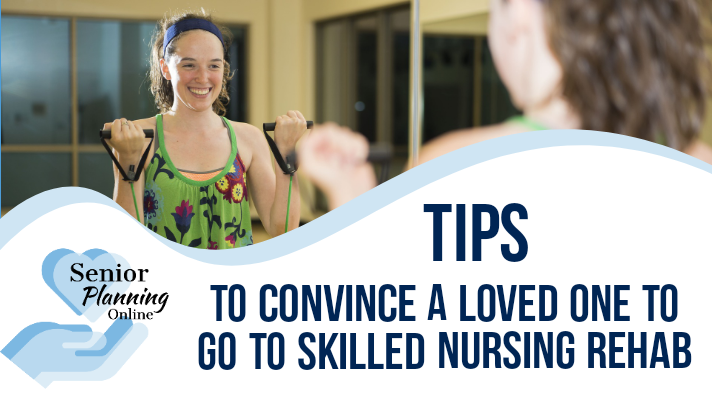A 75 year old woman admitted to my hospital after a fall. She had hit her head and broke her hip. She ended up getting surgery.
After surgery she worked with physical and occupational therapists for a day or two and they recommended that she go to a rehab facility to continue her recovery.
I remember talking to her son and daughter outside of her hospital room. They expressed deep concern for their mother and the condition she was now in.
At this point we discussed the recommendations made by the therapy team and her physicians. Going to a skilled nursing facility for rehab would be her best option to recover and build her strength back up. Her family felt like this was a great option for her. However, when it was presented to her, she adamantly refused and wanted to go home with home health care.
Her family became stressed. They worried about how they were going to be able to care for their mother at home when they worked full time. She was going to need help with getting dressed, bathing, toileting and having meals prepared for her. But at the same time, they wanted to respect their mother’s wishes.
This is a scenario that happens all too often with families. A loved one needs skilled nursing rehab, but they refuse to go. So what do you do?
I’m going to tell you how I am able to convince patients to go to a skilled nursing facility for rehab when they refuse. So keep reading!
Deciding if Rehab is What is Best
When this woman’s family approached her about the recommendations to go to a skilled nursing facility for rehab, her reaction surprised them.
“I don’t need rehab. I’ll just do the exercises that they showed me at home.” She made it very clear that she was not open to rehab.
Even after her son and daughter explained their concerns for her physical decline and ability to care for herself at home, she responded with “I’m not going anywhere. I have lived in my house for over 30 years, I’ll die in that house if I have to!”
There seemed to be no way to convince her to go to rehab.
She is their mother, she is an adult, she should be able to make her own decisions.
But then they thought, but how is she going to manage at home without help? Will she be safe? What if this happens again? How can they stay with her in her house 24/7 when they have families of their own to take care of?
They have full-time jobs. She needs to go to rehab, it’s what is best for her. But she is angry with me for even agreeing with the recommendation. Why is she refusing help?
Is this situation familiar to you? Have you wrestled with feelings of concern and guilt? Have you had these same questions and concerns?
How do you choose between what you know is best for your loved one and respecting their wishes?
This is when it becomes a matter of safety versus respecting independence.
The Fear of Losing Independence

As family members and friends of loved ones, we often feel this sense of responsibility towards our loved ones. We want to protect them and we also want to ensure their happiness.
As people age, they start to lose pieces of their independence. The things we were once able to do, become more difficult and we start needing help.
When I work with families who are trying to keep their loved ones safe but are frustrated when their loved ones don’t see it that way, this is what I tell them:
Imagine for a moment, that you are the one who has broken the hip. The doctors and your adult children are telling you that you need to go to a nursing facility for rehab.
What are your initial feelings?
Perhaps you feel nervous, anxious, apprehensive, scared, frustrated, distressed?
What are your thoughts?
Perhaps you are thinking “I can’t believe this is happening”; “how could this happen?” “Why can’t I just go home and do outpatient rehab or home rehab?” “I don’t want to be stuck in a nursing home for the rest of my life”
I can tell you, that all of these feelings and thoughts are exactly what your loved one, who needs rehab, is feeling right now. This is why they are refusing to go to rehab or to get nursing care.
How humiliating do you think it would be, to go from being the one who took care of your children, who raised them and kept them safe, to now unable to care for themselves.
Somehow they are now relying on their children for help. Society and culture, especially in America, has taught us to be independent. There is an expectation that we shouldn’t rely on anyone and that parents take care of children. That thought process doesn’t change when you get older.
What to Say to Convince them to go to Rehab
Putting yourself in your loved ones shoes can help you better understand how they might be feeling. It gives you the opportunity to set your frustrations aside and feel compassion towards them.
When I have difficult patients who refuse to go to rehab, even though it is clear that they would be unsafe to discharge back home, here is what I tell them:
- I validate their feelings of feeling helpless, frustrated, and uncertain. I make sure to let them know that I recognize their loss of Independence, no matter how temporary or permanent it might be
- I explain to them that the highest priority for the medical staff, their doctors, me as their social worker, and especially their family, want to help maintain their independence. Our goal is to make sure they stay in their home, safely, for as long as possible. It is NOT our goal to make them live in a nursing home for the rest of their life
- Because we all have a common goal to ensure their independence and good quality of life, there are tools and resources we need to utilize to make sure this happens. I let them know that rehab is one of those tools
- I explain that rehabilitation is necessary because it gives them the tools, care and resources to get them back to living in their home as quickly and as safely as possible. The goal is to get them strong enough and set up with the resources they need to continue to successfully live their lives independently.
- I review with them the financial responsibility of rehabilitation. Money is often a large factor for people as well. So I help them understand that their health insurance program will help pay for a short term rehab stay.
For more information on how short term rehab is paid for by health insurance, check out this post: Does Medicare Pay for a Skilled Nursing Facility?
Other Ideas and Tips
It may help to go check out a few skilled nursing rehabs to help yourself and your loved one understand what to expect. I have a great post about Top 15 Questions to Ask a Skilled Nursing Facility and How Do You Qualify for a Skilled Nursing Facility?
Another tip, I make sure to re-iterate, multiple times, that going to a skilled nursing facility for rehab is a temporary thing.
However, this isn’t the case for everyone. I still let them know that the goal is to make rehab a temporary thing. As they make progress, their care team can continue to evaluate them for an alternative living environment if needed.
Additionally, I ask the patient to switch roles. Just like I tell families to put themselves in their loved one’s shoes, I ask the patient to do the same. I ask the patient to consider what they would do if their child was in their position.
I ask them to imagine that their adult child has broken or injured something and that the doctors and medical team have told them that the easiest, safest and best way for them to heal and get back their life, is through rehab. What would they tell their child?
And if they say “well, that’s different”….and some of them do. I ask them, why they feel it’s different.
Why is it ok for them to feel concerned and worried about their adult child, but it’s not ok for their adult child to feel worried about them? Why do they feel the need to reject their child’s love? Because that is what they are doing, they are trying to love their parents and ensure they are cared for.
The Ultimate Goal
Usually when the patient looks at the recommendations through the perspective of their children, they are more willing to go to rehab. They are more certainly willing to go to rehab when they feel like their loved ones are on their side and have the same goal to get them back home.
At the end of day, helping a love done get their independence back is the ultimate goal. We want for them to be able to go home, we want for them to maintain their independence….but we also want them to do this in a very safe way. Because we care about them, we love them, just like they love us.
If you are struggling with a similar situation, when going to a facility is the best and safest option but they are refusing, I hope this gives you ideas. I hope you can use this to help your loved one feel heard and loved. And I hope these ideas can help convince them to get the help they need so that they can remain safe and independent in their homes.
Questions?
If you have any questions or would like some more specific advice on your situation. Send me an email! I would love to help!


No responses yet